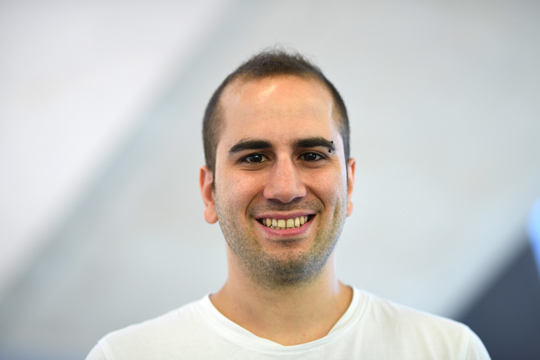Cleverer Plastic
Freiburg, Jul 11, 2018
Smartphones, biscuit packages, outdoor jackets: polymers are used in many everyday products. They are also seen as a promising raw material for the energy revolution, capable of being used to produce lightweight batteries for electric cars or affordable solar panels. The Master’s in Sustainable Materials – Polymer Sciences introduces students to how to sustainably develop such materials. In this series we introduce another seven international cooperations.
 Polymers are seen as a promising raw material for the energy revolution, capable of being used to produce lightweight batteries for electric cars or affordable solar panels.
Polymers are seen as a promising raw material for the energy revolution, capable of being used to produce lightweight batteries for electric cars or affordable solar panels.
Photo: Petair/Fotolia
Polymers are exceptionally large molecules. And they in turn are composed of individual molecules known as monomers, which are linked together as if on a thread. Polymers occur in nature, for instance as part of human DNA, and as plastic occur in many everyday products. On the International Master’s in Sustainable Materials – Polymer Sciences students learn how their chemical structures are developed and what they are used for in modern applications. The course has been offered since 2014 by the University of Freiburg in cooperation with the University of Strasbourg within the EUCOR – The European Campus trinational association.
The content of the English-language Master’s consists of two components: “Students learn how we produce the structure of polymers. This is something that they will put into practice later in the industry,” explains Prof. Dr. Andreas Walther, who heads the degree program at the University of Freiburg. In addition, the aim is to raise awareness about the sustainable use of these materials. “At the moment there’s a public discussion about microplastics in the oceans. We want to make students aware of how one prevents it reaching the sea, and how we can develop the material so that it no longer poses a problem for the environment.”
Plastic and its potential
Recycling loops and sustainable sources are therefore also part of the curriculum. The fact is, plastic is better than it is believed to be, “Polyethylene – the material in every shopping bag – is in fact a sustainable material, even though it’s produced from mineral oil. It has a long recycling chain, and even if you burn the bag at the end of this cycle the energy of the mineral oil remains, and can be used for other purposes.” Polymers are used as a raw material of the energy revolution, capable of being used to produce light-weight batteries for electric cars or affordable solar panels.
In order to develop an understanding of these relationships, the students learn the principles of materials sciences during the first semester at Strasbourg. Then they switch to the University of Freiburg and take an internship in macromolecular chemistry. On the third semester students choose between various modules – for example from the fields of “Nanostructured materials”, “Engineering” or “Biomaterials and biosystems”– and start to specialize. This diversity is possible because at Freiburg the degree program is offered by the Faculty of Engineering as well as the Faculty of Chemistry and Pharmacy. Students have the option of attending the courses and internships there or at the University of Strasbourg. This means that the Master’s can be designed to suit the individual, explains Walther.
Simplifying the move
Coordinator Véronique Ragot guides students through all the administrative work involved in the Master’s degree from application to completion. Amongst other things she gives advice concerning the examination program, deadlines, and finding accommodation, and tries to ensure that the transition between the sites is as smooth as possible. “Switching between the two cities is a challenge to the students,” she explains. “They have to adapt rapidly to the new environment as well as to the teaching and learning culture of a different country.” The Master’s currently attracts about 40 students each semester – it is also very popular with Bachelor’s degree graduates from China and India. A new introductory course is also expected to make their start in Germany and France easier: they can take a course in intercultural skills, specially devised by the universities for students of Sustainable Materials, to teach them for example how they should behave towards a professor in their new environment.
What students learn they also promptly put into practice. So the Master’s degree offers excursions to polymer technology companies and lectures by experts in the field. And it has been successful, “Our graduates are in demand in the industry,” says Walther. “They can join companies that produce polymers or that process them into products, such as lightweight construction or the cosmetics industry.” So the degree program offers as much potential as the matter it studies – the polymers.
Sonja Seidel
Master of Science Sustainable Materials – Polymer Sciences
The Master’s study program starts at the beginning of each winter semester.
Applications can be submitted up until 15 July each year.
The course of studies takes four semesters.B2 level English language skills are required.
The Master’s program leads to a double degree from the Universities of Freiburg and Strasbourg.
More information
 “After doing my Bachelor’s degree in Materials Science and Engineering at the Sabancı University of Istanbul, Turkey, I wanted to study for a Master’s degree that dealt with polymers. It’s an extremely promising field but at the same time industry often lacks expertise, as I noticed while doing my internship. The Master’s degree in Sustainable Materials encourages and promotes self-reliance, precisely because it consists of many different modules and specialist areas. Ultimately however all these parts formed a whole.”
“After doing my Bachelor’s degree in Materials Science and Engineering at the Sabancı University of Istanbul, Turkey, I wanted to study for a Master’s degree that dealt with polymers. It’s an extremely promising field but at the same time industry often lacks expertise, as I noticed while doing my internship. The Master’s degree in Sustainable Materials encourages and promotes self-reliance, precisely because it consists of many different modules and specialist areas. Ultimately however all these parts formed a whole.”
Ozan Erverdi studies Sustainable Materials – Polymer Sciences.
Photo: Patrick Seeger

“The degree program is unique in its approach, as it covers various specialist areas. For instance, we have the choice of four different modules in Freiburg. You can continue on the same path for your Master’s, depending on what Bachelor’s degree you took: I had a background in polymer engineering so I chose a module that was also in this area. The degree program offers experience both for those who want to work in research and for those who want to go into industry. Thanks to this extensive experience I was lucky enough to get an internship in a company in Switzerland.”
Ahmar Hasnain studies Sustainable Materials – Polymer Sciences.
Photo: Patrick Seeger

